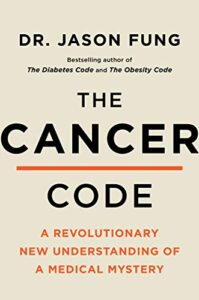Over the past few years, I’ve taken it upon myself to learn more about health, nutrition, and fitness. I’m not implying that I don’t trust my doctor, or the medical profession in general. However, if the information is out there, why shouldn’t I read it? There’s nothing wrong with a little knowledge, especially when it comes to our own body and health. It also leads to more productive conversations with my doctor during my annual check-up.
As part of my personal health education process, I recently read The Cancer Code: A Revolutionary New Understanding of a Medical Mystery by Dr. Jason Fung. Cancer has been one of the most lethal diseases of my lifetime, and I wanted to understand more about it, how it’s treated, and possibly how to prevent or delay its onset.
When I wanted to learn more about fasting, I read Dr. Fung’s The Complete Guide to Fasting which was very informative and a book I would highly recommend. Based on that experience, I had high expectations for The Cancer Code.
I’m going to start by saying that The Cancer Code lived up to my expectations. It’s not going to provide any breakthrough insight into how to prevent cancer, how to stop the disease’s progression should you come down with it, or how to cure it. What it explains is how our knowledge of the disease has grown over time, what we know about the disease and how it evolves, the pitfalls of historical treatments, the issues with recent research, and how new methods to attack the disease may prove to be the breakthrough the science and medical community have been seeking out for well over a hundred years or more.
The short synopsis is that every cell in our body has the traits of a single cell organism that is programmed to survive at all costs. As part of a multi-cell organism, such as the human body, our cells have evolved specialized traits that form skin cells, heart cells, lung cells, brain cells, liver cells, and, well, you get the picture. Unfortunately, when this specialization breaks down and cells go rogue, meaning they revert to their single cell survival traits, cancerous tumors can develop. Fortunately for us, our immune systems contain and purge these rogue cells before they turn into tumors. However, if our immune system fails us, cancerous cells take hold. When that happens, it becomes challenging for our bodies to fight the disease, and, in many cases, impossible as the cancer takes over and kills the host.
Through this historical view of the disease, Dr. Fung looks at why certain treatments work, why they fail, and why some only delay its deadly consequences. It’s also why he believes that modern approaches that rely on the body’s own immune system to fight and treat the disease may be our best option going forward.
Having said all of this, I’m not qualified enough to know if Dr. Fung’s research or hypotheses are valid. From a common sense point of view, they certainly make sense to me. I’ve also had conversations with a few people I know who work in the area of cancer research, and they have independently cited some of the same findings Dr. Fung has. In other words, I have no reason not to believe the findings he presents in the book.
I suppose what I’m saying in a roundabout way is that I would highly recommend The Cancer Code and consider it a Must Read. It’s enlightening, accessible, will help you to understand what is being done in the field of cancer research, and provide hope that more effective methods to treat the disease are on the horizon.

